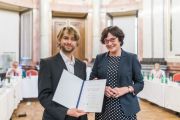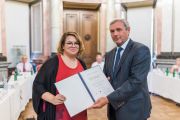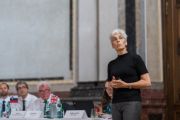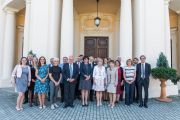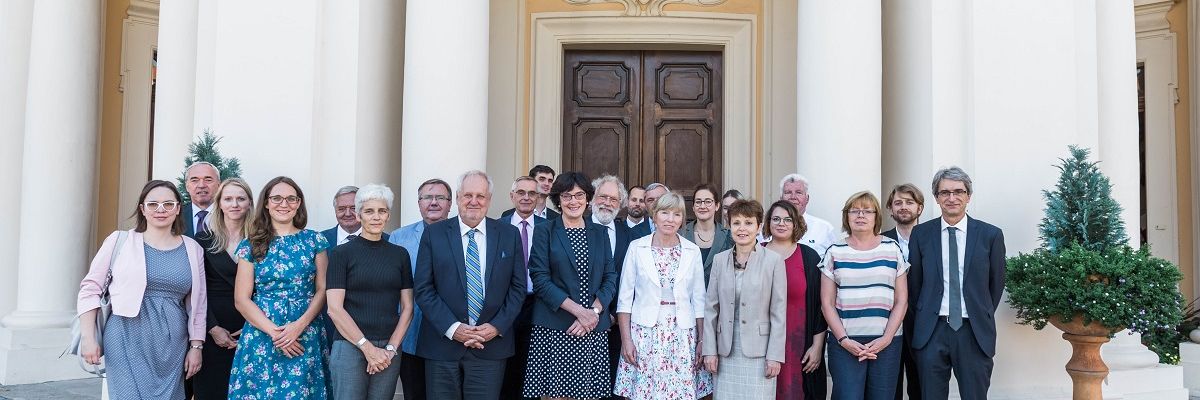
The Visegrád Four Academies Forum took place at the Liblice Castle
The Visegrád Four Academies Forum took place at the Liblice Castle
Mon Sep 17 10:19:00 CEST 2018
Representatives of the Academies of Sciences of the Visegrád Four (V4) countries, that is the Czech Republic, Hungary, Poland and Slovakia, held their annual meeting on 11–13 September 2018. This year they met at the invitation of the President of the Czech Academy of Sciences (CAS) at the Liblice Castle in Central Bohemia.
This year´s V4 Academies Forum was exceptional since it also welcomed representatives of the Austrian and Slovenian Academies of Sciences and of the UK Royal Society.
The main topics on its agenda included measures aimed at increasing the countries´ success rate in EU research, development and innovation programmes and projects as well as the further enhancement of bilateral scientific cooperation within the framework of the V4 Academies. The participants also addressed the issue of the underrepresentation of women in science and other challenges facing their institutions and science in general in their respective countries.
President of the Czech Academy of Science Professor Eva Zažímalová points out that delegates usually deal with issues burning all of them. “When some of the Academies gets into a complex situation, we address that urgent topic, too.” In agreement with this determination, this time the conference paid special attention to difficulties experienced by the Slovak Academy of Sciences.
Competing for ERC grants and funding within EU Framework Programmes
Great attention was paid primarily to V4 countries´ unsatisfactory results in competing for ERC grants and funding within EU Framework Programmes.
Professor Ladislav Kavan from the J. Heyrovský Institute of Physical Chemistry of the CAS, a member of the Academy Council, stressed – among other things – that the CAS should focus its attention on theEU’supcoming Horizon Europe Framework Programme, since it offers new instruments that can make it easier for academic teams to win EU grants: “We could take the advantage of the Seal of Excellence initiative, the purpose of which is to finance excellent innovation projects. The overall success rate of grant applications is relatively low in the whole of Europe – roughly 14 to 15%, which means that as many as 85% of projects are rejected. That is not only frustrating for teams submitting the projects but it is also a significant loss of time and money.
To improve this situation the EU has introduced its Seal of Excellence. This label is designed for high-quality projects that were submitted to Horizon 2020 but did not receive funding due to budget limits. It recognises the value of those proposals and supports their search for alternative funding.
Dr. Hana Sychrová, a member of the Academy Council of the CAS, mentioned little experience and the lack of supporting apparatus as the major obstacles hindering scientists from winning more grants. The CAS is therefore taking measures to help improve the situation.
Referring to V4 states, Professor Mihály Pósfai, Member of the Presidium of the Hungarian Academy of Sciences, added: “I think large projects are favoured at framework programmes, especially in Horizon 2020, but research institutes are smaller in these countries – so in general, they have a lesser chance to compete with more well-off countries like Germany, UK, France and others. Secondly, government spending is lower in these countries as well. Nevertheless, if you look at the amount of money spent on research and development, there is a linear correlation between money put into research and the success rate in the European research area.”
Professor Tadej Bajd, President of the Slovenian Academy of Sciences and Arts, agrees: “If the national financing is not sufficient, then it is difficult to expect greater success in applying for European projects, especially the ERC projects that are meant mainly for young people.”
Professor Jerzy Duszyński, President Polish Academy of Sciences stressed another aspect: “The main obstacle is that our countries are not strong enough in science. We have a long way to go to attain the level of excellence, which has been already reached by the top achievers like UK, Germany, the Netherlands and so on. We are making progress, but it will take a lot of time; we expect that in five years we will be doing much better. We have special programmes to achieve this goal – and we start to have successes.”
Apart from the above-mentioned topics, the V4 Academies Forum in Liblice debated the development of science and its main commitments from a more general point of view. Asked about the major challenges faced by British science nowadays, Professor Ulrike Tillmann, Vice President of the Royal Society of the United Kingdom and the Commonwealth, answered: “Brexit is one. We are also looking at science areas where we can foresee possible difficulties with society or within science and changes in society – IT and artificial intelligence are one of them. Data science comes in there. Then another area we are doing quite a bit of work on right now is gene editing. Again – there are huge moral implications potentially. And I think people in general have to be prepared to understand what it means and what potential implications might come through it.”
Professor Anton Zeilinger, President of the Austrian Academy of Sciences, stressed the need to conduct a dialogue between scientists and politicians, which has resulted in political decisions supporting science in a long-term perspective in his country. “You simply meet, for example, members of parliament and discuss with them – not the funding of science, not money for us, but topics of general interest, concerning the public. Right now, these include, for instance, challenges related to digitalization, the digital economy and so on. Consequently, that has brought in great mutual esteem – politicians respect scientists and vice versa scientists show respect to politicians. This is a very good basis.”
Professor Zeilinger nevertheless stressed one issue he finds worrying, maybe even on a worldwide scale: “That is the increasing pressure to support innovation – in the sense of innovations that can be more or less immediately applied. That is dangerous because we all know that really important ideas are not those the purpose of which is obvious at once, but which shows only later. Such as in the case of lasers – nobody knew immediately what could be done with them – and there are many examples like that. So I would like to see more openness to unexpected risky research than what the current trend is.”
MORE ON THE TOPIC
Statement of the Parners of Visegrad Group Academies Forum
Opening photography: V4 Academies forum
Prepared by: Jana Olivová, Division of External Relations SSČ AV ČR
Photo: Pavlína Jáchimová, Division of External Relations SSČ AV ČR 

